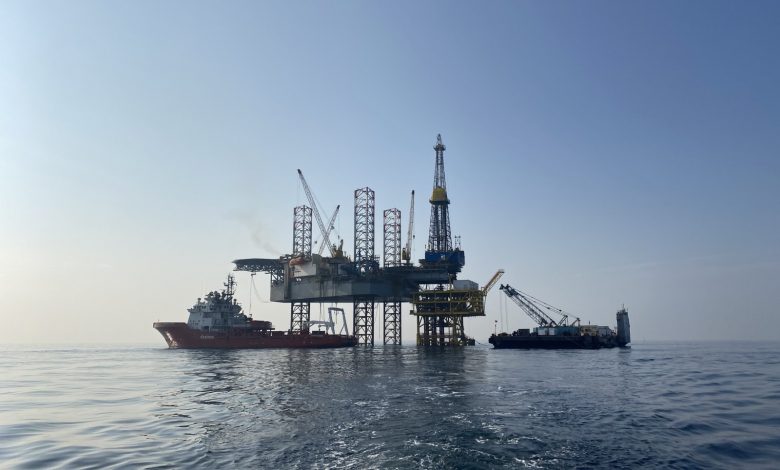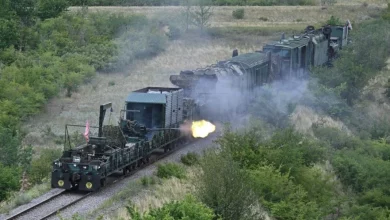Türkiye bets on expanded infrastructure to wean off energy dependence

Two offshore facilities stand tall in the middle of Türkiye’s northwestern Silivri off the coast, a remote but popular town in Istanbul where natural gas is injected and withdrawn from storage under the sea before being delivered to the main network system.
The drilling facilities are connected via pipelines to the Silivri Underground Natural Gas Storage Facility. Recently, a ceremony to mark an increase in capacity was organized at the facility. The capacity increase is enabling the storage of 4.6 billion cubic meters (bcm) of gas at the underground facility, up from an earlier capacity of 3.2 bcm.
The site’s daily withdrawal capacity of 28 million cubic meters (mcm) has been increased to 75 mcm. Given the capacity increase, the facility has become the biggest storage site in Europe.
The Silivri facility, along with a second underground natural gas storage facility in central Türkiye, is a step that the country is currently taking to meet its domestic needs during peak times, especially winters which are expected to be hard around the world due to Russia’s invasion of Ukraine.
Türkiye, a country that heavily depends on sources from abroad for energy, has been developing its infrastructure by leaps and bounds both in terms of pipelines or liquefied natural gas (LNG) and storage capacity. The country is ramping up its efforts to meet domestic needs while coming to the fore as an alternative energy hub that would benefit Europe amid the energy crisis.
Speaking to a group of journalists at the Silivri facility, Talha Pamukçu, a board member and the deputy managing director of Türkiye’s state energy importer, Petroleum Pipeline Corporation (BOTAŞ) which runs the facility, said the country is already meeting all the “physical conditions,” to become an energy hub, thanks to its pipeline, LNG and storage infrastructure, apart from the fact that it owns an energy trading exchange, EPIAŞ.
International agreement is the only thing needed for Türkiye to become an energy hub as the country is ready in terms of infrastructure, Pamukçu added.
He further evaluated that the main aim of storage facilities is to meet the seasonal demand and that the stored gas is mostly used in winter when the demand along with power generation is higher for household consumption.
Noting price fluctuations, Pamukçu highlighted that gas is stored during summer when the prices are relatively low and then used during peak times when prices are high. Thus, this maintains a price balance.
Türkiye currently has two underground facilities: One is Silivri and the other is an onshore facility near Tuz Gölü (Lake Tuz) whose capacity will also be increased in the upcoming period. Currently, the Lake Tuz facility has a 1.2 bcm capacity and Silivri has 4.6 bcm, totaling 5.6 bcm.
After the capacity increase in Lake Tuz, the aim is to reach about 10 bcm of storage capacity, which will meet some 20% of the total annual consumption of the country, Pamukçu underscored.
Noting that according to EU regulations, each country needs to have a storage capacity of at least 20% of its annual consumption, he said that “Türkiye is getting to that point.”
The Silivri facility alone will be able to meet a quarter of the country’s demand on its own, even during intense consumption phases.
Türkiye’s annual gas consumption rose from 48 bcm in 2020 to a record 60 bcm in 2021. This year’s consumption is expected to stand at around 53.5 bcm. The figures were estimated up to 63 bcm earlier, however; the power generated from renewable resources this year decreased gas consumption.
Russian gas covers almost half of Turkish energy needs. The country also imports gas from Iran and Azerbaijan through pipelines and purchases LNG from Qatar, Nigeria, Norway, Algeria and the United States.
Last month, the country’s natural gas imports decreased by 30.47% compared to the same month in 2021, according to data released by the country’s energy watchdog. Natural gas imports this October fell to around 3.23 billion cubic meters (bcm) from approximately 4.65 bcm in the same month of 2021, Türkiye’s Energy Market Regulatory Authority (EPDK) said in its latest monthly natural gas market report.
According to EPDK data, the country imported approximately 2.38 bcm of natural gas via pipelines in October, while 857 million cubic meters (mcm) were purchased as LNG. This represented a 47.56% decrease in pipeline imports and a 21.23% decrease in LNG imports.
Along with investments made in infrastructure, Türkiye has been diversifying its energy sources and was benefiting from cheaper LNG prices. Currently, Türkiye operates four LNG terminals, two of which are the floating storage and re-gasification unit (FSRU) and the remaining two are land facilities. Meanwhile, work for a new FSRU in northwestern Türkiye’s Gulf of Saros is underway.
The inauguration ceremony of the fifth LNG facility will be organized soon.
The country has an FSRU unit located in the Aliağa district of the Aegean province of Izmir that is run by the Kolin-Kalyon Enerji Çelikler Joint Venture Group and operated by Etki Liman Işletmeleri.
The Aliağa FSRU has replaced Türkiye’s first FSRU that entered service in 2016 as a larger-capacity facility in 2019. With a storage capacity of 170,000 cubic meters of gas, the FSRU compresses 28 mcm of natural gas to the system daily.
There is also an FSRU terminal in the Dörtyol district of the southern province of Hatay, the launching ceremony of which was held on Feb. 7, 2018, and is operated by BOTAŞ. The terminal was dubbed “crucial” in terms of Türkiye’s energy supply security as being the world’s largest storage capacity FSRU with 263,000 cubic meters of LNG storage capacity.
The country is also counting the days to deliver gas from its discovered reserves in the Black Sea in 2023.
Türkiye on Monday revised its estimate of natural gas reserves in the Black Sea upward by nearly a third after a new field was located and after appraisal work at a previous site.
President Recep Tayyip Erdoğan said that the total volume of gas Türkiye has gradually discovered in the offshore fields now amounts to 710 billion bcm – a find that is estimated to have a market value of $1 trillion.





